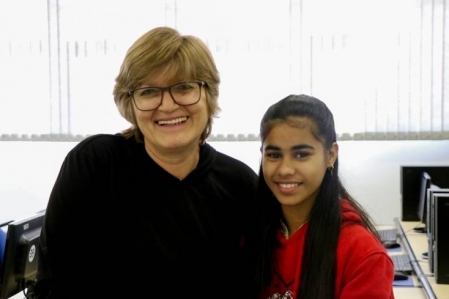07 Outubro de 2019
A connecting tool with Brazil
More than 30 immigrants from Egypt, Pakistan, Haiti, Senegal, Guinea-Bissau and Bangladesh find in the “Vem pra cá!” Extension project a way to connect with Brazil. The University of Vale do Taquari - Univates offers Portuguese as an additional language classes taught by scholarship holders and volunteers. Free classes take place weekly at the Presidente Castelo Branco State School.
Coordinating the project is the professor of the Language Program at Univates Maristela Juchum. The professor recalls that, at the beginning of the project, in 2014, they sought to meet the emerging demand in the Taquari Valley. “The Univates Language Program trained students and volunteers through a forum on the teaching of Portuguese as an additional language to address the need to meet the demand of immigrants arriving weekly in large numbers,” she says. In the period, classes were held in the jobs of the immigrants. After that the action gained more strength and became an extension project. According to the professor, the project helps foreigners in social inclusion and facilitates communication with the local community.
Pakistani Shoaib Barki has lived in Brazil since 2016 and a year ago moved to Rio Grande do Sul. “This project helped me a lot, because before I didn't speak Portuguese well and it was very difficult. I also learned about culture and grammar”, he says. The “Vem pra cá!” Classes are based on a socio-interactionist view. The group of teachers and volunteers plans teaching units based on topics that are of interest to students, such as work, health, food and culture.
One of the volunteers who helps design the classes is the teacher Isolde Villa Brust. She says she decided to join “Vem pra cá!” when she noticed the presence of immigrants in her classrooms. The teacher warns of the great difference between teaching Portuguese to Brazilians and to immigrants.
“There is no material that says: this is how you teach Portuguese to immigrants. I was creating, learning, seeing their difficulties. I made, for example, an illustrated dictionary, with the images and with script and block letters”, she reports. In addition, Isolde recalls the importance of language as a tool for community integration.
“They already have knowledge, what they don't have is this knowledge of the language, which for many is the fourth language,” explains the teacher.
Still with the accent of her home country, Odette Dejour agrees with the teacher. “I like Portuguese,” says the 21-year-old Haitian. For her, in addition to learning, classes are a time to meet new friends. Md Tipu Miah from Bangladesh has been in Brazil for five years. He has been participating in the project for a year and says: “Now it's much better, I'm very happy here in Rio Grande do Sul”.
The "Vem pra cá!" has gradually been gaining more space. Now classes also take place at the Nicolau Mussnich State School of Basic Education in Estrela. According to Maristela, the idea is to train more volunteers and to expand the offer of Portuguese Language classes to immigrants who are in the region. “The classes that take place at the Nicolau Mussnich School meet the request of the immigrants resident in Estrela, who would not be able to come to Lajeado to participate in the classes,” concludes the teacher.
